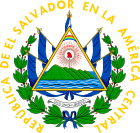
Legislative elections were held in El Salvador on 31 March 1985. The result was a victory for the Christian Democratic Party, which won 33 of the 60 seats. Voter turnout was 42%.

Legislative elections were held in El Salvador on 12 March 1972. The result was a victory for the National Conciliation Party, which won 39 of the 52 seats. However, the election was marred by massive fraud and the Central Election Council disqualified the candidates of the opposition National Opposing Union in five out of fourteen constituencies. Voter turnout was 56.7%.

Legislative elections were held in El Salvador on 8 March 1970. The result was a victory for the National Conciliation Party, which won 34 of the 52 seats. However, the election was marred by massive fraud. Voter turnout was just 41.6%.

Legislative elections were held in El Salvador on 10 March 1968. The result was a victory for the National Conciliation Party, which won 27 of the 52 seats. Voter turnout was just 36.6%.

General elections were held in El Salvador between 26 and 29 March 1950. The result was a victory for Óscar Osorio in the presidential election, and his Revolutionary Party of Democratic Unification in the legislative election.
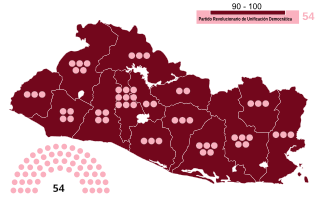
Legislative elections were held in El Salvador in March 1952. The result was a victory for the Revolutionary Party of Democratic Unification, which was the only party to contest the elections as the opposition Renovating Action Party claimed that they were rigged.

Legislative elections were held in El Salvador in March 1954. The result was a victory for the Revolutionary Party of Democratic Unification, which was the only party to contest the elections as the opposition Renovating Action Party claimed that they were rigged.

Legislative elections were held in El Salvador on 15 May 1956. The result was a victory for the Revolutionary Party of Democratic Unification, which won all 54 seats.

Legislative elections were held in El Salvador on 23 March 1958. The result was a victory for the Revolutionary Party of Democratic Unification, which won all 54 seats unopposed after opposition candidates withdrew from the elections.

Legislative elections were held in El Salvador on 24 April 1960. The result was a victory for the Revolutionary Party of Democratic Unification, which won all 54 seats after the Central Electoral Council had disqualified the candidates of the Renovating Action Party in seven of fourteen constituencies.
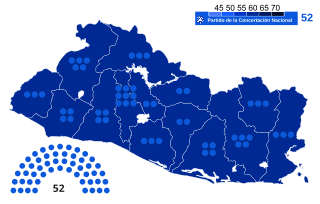
Constitutional Assembly elections were held in El Salvador on 17 December 1961. The result was a victory for the National Conciliation Party, which won all 54 seats.
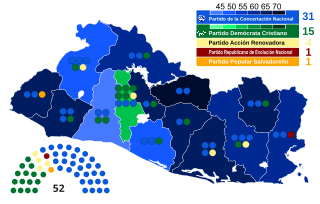
Legislative elections were held in El Salvador on 13 March 1966. The result was a victory for the National Conciliation Party, which won 31 of the 52 seats.

Presidential elections were held in El Salvador on 4 March 1956. The result was a victory for José María Lemus of the Revolutionary Party of Democratic Unification, who received 95.2% of the vote.

Presidential elections were held in El Salvador on 30 April 1962. Julio Adalberto Rivera Carballo of the National Conciliation Party was the sole candidate and was elected unopposed.

Presidential elections were held in El Salvador on 5 March 1967. The result was a victory for Fidel Sánchez Hernández of the Party of National Conciliation, who won 54.4 percent of the vote.

Presidential elections were held in El Salvador on 20 February 1972. The result was a victory for Arturo Armando Molina of the Party of National Conciliation (PCN), who received 43% of the vote. However, the election was characterised by massive fraud. The PCN had faced a strong challenge from left- and right-wing opposition, and as a result had tried to rig the election by holding the presidential elections two weeks before the legislative election to ensure that if Molina failed to pass the 50% mark, the Legislative Assembly would still be under PCN control to approve him as president. Despite their attempts to stuff ballot boxes, it looked for a while as though José Napoleón Duarte of the opposition National Opposing Union had been victorious after the Central Election Board in San Salvador issued a statement that Duarte had won by around 6,000 votes. However, this was followed by a three-day news blackout, after which a revised set of figures was announced giving a narrow victory to Molina, meaning that the Legislative Assembly would choose the president. The opposition walked out of the vote, resulting in Molina being elected by 31 votes to zero.

Constituent Assembly elections were held in Honduras on 22 September 1957. In November the Assembly elected Ramón Villeda Morales as president.

General elections were held in Nicaragua on 4 November 1984, to elect a president and parliament. Approximately 1.2 million Nicaraguans voted, representing a 75% turnout, with 94% of eligible voters registered. Impartial observers from international groupings such as the European Economic Community, religious groups sent to monitor the election, and observers from democratic nations such as Canada and Ireland concluded that the elections were generally free and fair.
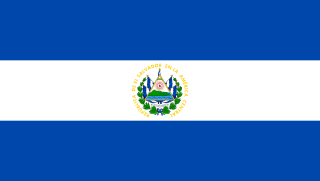
The Salvadoran military dictatorship was the period of time in Salvadoran history where the Salvadoran Armed Forces governed the country for almost 48 years from 2 December 1931 until 15 October 1979. The authoritarian military dictatorship limited political rights throughout the country and maintained its governance through rigged and fixed elections.

Death squads in El Salvador were far-right paramilitary groups acting in opposition to Marxist–Leninist guerrilla forces, most notably of the Farabundo Martí National Liberation Front (FMLN), and their allies among the civilian population before, during, and after the Salvadoran Civil War. The death squads committed the vast majority of the murders and massacres during the civil war from 1979 to 1992 and were heavily aligned with the United States-backed government.
